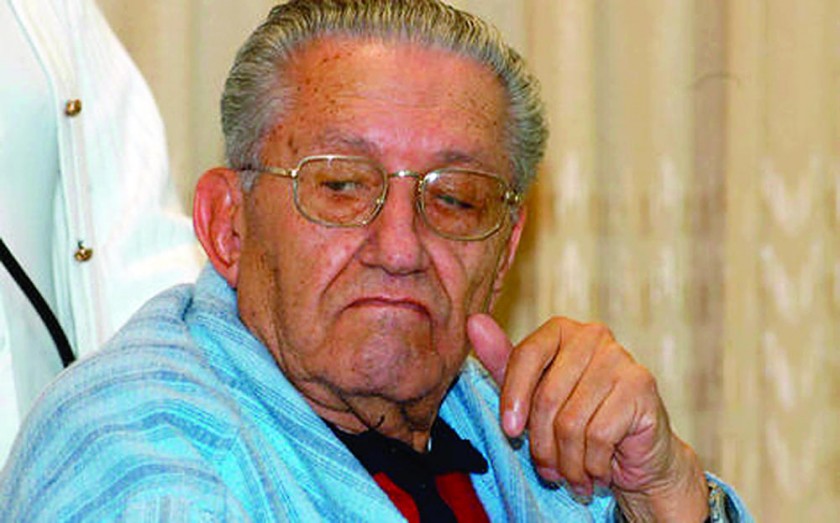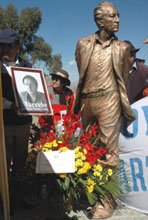Latin America
Related: About this forumBolivia's self-proclaimed president, Jeanine Anez, tied to cocaine trafficking
Self-proclaimed President of Bolivia Jeanine Áñez, who took office two days after a violent coup forced President Evo Morales to resign, has been reported to have close family ties with at least one major drug trafficker.
Áñez's nephew, Carlos Andrés Añez, was arrested on October 16, 2017, with Calí Cartel associate Fabio Andrade Lima Lobo in the neighboring Brazilian state of Mato Grosso.
According to the police report they were in possession of no less than 480 kilos (1,058 lbs.) of pure cocaine - its street value estimated at over $60 million.
"The subject who has been apprehended infraganti with 480 kilos of drugs in Brazil is Mr. Carlos Andrés Añez Dorado, who is the nephew of Jeanine Añez Chávez, senator for the Democratic Unity party," Bolivian Interior Minister Carlos Romero confirmed at that time.
"So, in this case, we are talking about a family bond with a person in politics.”
Romero, like many Morales officials and lawmakers from Morales' left-wing MAS, was forced to seek refuge, and has been in the Argentine Embassy since the coup last Sunday.
Argentine President-elect Alberto Fernández, who helped negotiate President Morales' exit from Bolivia to Mexico on November 12, has called on outgoing President Mauricio Macri to extend political asylum to Romero or any other officials or lawmakers currently under threat.
At least 21 Bolivians have been killed since the coup amid massive demonstrations.
At: https://translate.google.com/translate?hl=en&tab=wT&sl=auto&tl=en&u=http%3A%2F%2Fkontrainfo.com%2Flos-vinculos-con-el-narcotrafico-de-la-autoproclamada-presidenta-de-bolivia-jeanine-anez%2F
Bolivia's self-proclaimed president, Jeanine Áñez, new nephew, Carlos Áñez, and the latter's partner, Calí Cartel associate Fabio Andrade, with part of the 480 kg of pure cocaine seized by Brazilian authorities in 2017.
Áñez - who became Bolivia's president over at least two others in the order of succession and without senate quorum - has been compared to the U.S. installation of Guillermo Endara as President of Panama in 1989.
Endara had served as director of a bank targeted by the FBI and DEA as a major laundering front for the Calí and Medellín cartels.
Like Áñez, Endara's partner had been arrested (in Georgia) for attempting to traffic half a ton of pure cocaine.
Judi Lynn
(160,515 posts)
Carlito.
Reminds one immediately of the Cocaine Coup President, Luis García Meza. Wikipedia:
Prelude to dictatorship
García Meza graduated from the military academy in 1952, and served as its commander from 1963 to 1964. He then rose to division commander in the late 1970s.
He became leader of the right-wing faction of the military of Bolivia most disenchanted with the return to civilian rule. Many of the officers involved had been part of the Hugo Banzer dictatorship and disliked the investigation of economic and human right abuses by the new Bolivian congress. Moreover, they tended to regard the decline in popularity of the Carter administration in the United States as an indicator that soon a Republican administration would replace it—one more amenable to the kind of pro-US, more hardline anti-communist dictatorship they wanted to reinstall in Bolivia. Many allegedly had ties to cocaine traffickers and made sure portions of the military acted as their enforcers/protectors in exchange for extensive bribes, which in turn were used to fund the upcoming coup. In this manner, the narcotraffickers were in essence purchasing for themselves the upcoming Bolivian government.
Coup d'état
This group pressured President Lidia Gueiler (his cousin) to install General García Meza as Commander of the Army. Within months, the Junta of Commanders headed by García Meza forced a violent coup d'état, sometimes referred to as the Cocaine Coup, of 17 July 1980, when several Bolivian intellectuals such as Marcelo Quiroga Santa Cruz were killed. When portions of the citizenry resisted, as they had done in the failed putsch of November 1979, it resulted in dozens of deaths. Many were tortured. Allegedly, the Argentine Army unit Batallón de Inteligencia 601 participated in the coup.
Dictatorship, 1980-81
Of rightwing ultra-conservative anti-communist persuasion, García Meza endeavored to bring a Pinochet-style dictatorship that was intended to last 20 years. He immediately outlawed all political parties, exiled opposition leaders, repressed trade unions and muzzled the press. He was backed by former SS officer and Nazi German war criminal Klaus Barbie and Italian neofascist Stefano Delle Chiaie. Further collaboration came from other European neofascists, most notoriously Spanish Ernesto Milá Rodríguez (accused of the 1980 Paris synagogue bombing).[1] Among other foreign collaborators were professional torturers allegedly imported from the notoriously repressive Argentine dictatorship of General Jorge Videla.[citation needed]
The García Meza regime, while brief (its original form ended in 1981), became internationally known for its extreme brutality. The population was repressed in the same ways as under the Banzer dictatorship. In January 1981, the Council on Hemispheric Affairs named the García Meza regime, "Latin America's most errant violator of human rights after Guatemala and El Salvador."[2] Some 1,000 people are estimated to have been killed by the Bolivian Army and security forces in only 13 months.[3] The administration's chief repressor was the Minister of Interior, Colonel Luis Arce, who cautioned that all Bolivians who opposed the new order should "walk around with their written will under their arms."
The most prominent victim of the dictatorship was the congressman, presidential candidate, and gifted orator Marcelo Quiroga, murdered and "disappeared" soon after the coup. Quiroga had been the chief advocate of bringing to trial the former dictator, General Hugo Banzer (who was in power from 1971 until 1978), for human right violations and economic mismanagement.
More:
https://en.wikipedia.org/wiki/Luis_Garc%C3%ADa_Meza
I believe, in time, when the wildly abused majority of Bolivians, the indigenous people and the human beings will win back the Presidency. It has been a constant, painful struggle for them.
Thanks for this important info. on the person should only be a small spot on the line of Bolivian history. Sad, and awful. The people need the best wishes of the rest of humanity.

Earlier García Meza

Older García Meza
All in a day's work for fascist dictator, García Meza:
Luis García Meza: “They wanted to burn Marcelo for the spirits and he just singed”
He points out that the one who killed the socialist leader was de facto former president Hugo Banzer and that the body would be in San Javier.
The former dictator Luis García Meza Tejada (1980-1981) revealed that a group of low-ranking soldiers, led by former Interior Minister Luis Arce Gómez, intended to incinerate the remains of the socialist leader, Marcelo Quiroga Santa Cruz, after he was killed in the headquarters of the Central Obrera Boliviana (COB).
The de facto former president - in an interview with the communicator Gezien Manzilla - indicated that his former trusted man was the one who was in charge of complying with the operation of transfer of the body from 16 de Julio Avenue (El Prado) to the facilities of the General Staff .
"Arce Gómez took over. With several noncommissioned officers he cut a turril, they put him there with gasoline, for the spirits they wanted to burn him and Marcelo just singed," he said.
The ex-authority added that Marcelo had already died when there was an attempt to incinerate him, which is evidenced in the photographs published in the missing Meridian newspaper of the city of La Paz.
The former head of the Socialist Party One, along with Carlos Flores Bedregal, was one of the first victims of the coup d'etat of July 17, 1980 and interrupted the interim mandate of Lidia Gueiler. That unconstitutional period lasted until October 10, 1982
c Tejada explained that after that, another exdictor - Hugo Banzer Suarez - asked for his body.
More:
https://www.paginasiete.bo/nacional/2016/1/23/luis-garcia-meza-quisieron-quemar-marcelo-animas-solamente-chamusco-84357.html#!

"socialist leader, Marcelo Quiroga Santa Cruz"
beloved supporter of the people, murdered by
García Meza

